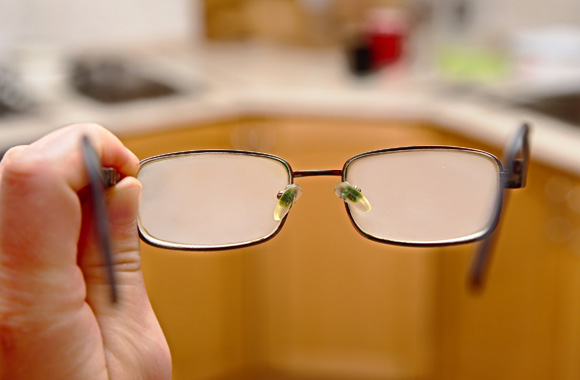Anti-Fog Lenses
If you wear eye glasses, you’ve probably experienced an annoying problem: they often get fogged up. This can happen whilst cooking, doing exercise, even while trying to take a sip from a hot cup of coffee. However, for some people, the problem can be dangerous. If your glasses fog up whilst driving a car or a motorbike, or operating heavy machinery, the result could be catastrophic. Luckily there are now lenses with anti-fog coating, making life easier and a lot safer.
What Are Anti-fog Glasses?
The fog that forms on eye glasses is caused by condensation - when moist air hits the cool surface of your lenses, leaving tiny droplets of water and causing them to look foggy. Anti-fog agents have been developed to help combat this problem, allowing the water droplets to create an invisible film on the lenses instead of clouding over. First developed by NASA in the 60's, anti-fogging agents are now used on mirrors, cameras, goggles, glasses and more.
Optifog is one of the latest technologies to offer protection from fogged up glasses. Optifog also provides UV protection technology to prevent sunlight from getting into your eyes. Anti-fog glasses often require an activation spray, which comes with the glasses on a purchase, but this spray only needs to be used once a week. One spray is sufficient, carefully wiped across each lens with a microfibre cloth.
When Should Anti-Fog Glasses Be Used?
Anti-fog glasses are now made with a permanent anti-fog coating, and as this doesn’t interfere with your vision through the glasses, they can be worn all the time. They can be particularly useful for:
- People who live in cold climates
- Runners, athletes and people active in sports
- Police and medical professions such as doctors and nurses
- Motorcyclists
- People who work in hot, humid kitchens
- People who work outdoors
However, as fogging can occur in everyday life, many people can benefit from these types of glasses. Even cooking at home, opening a dishwasher or oven can cause glasses to steam up, so anti-fog glasses can be a practical choice for a lot of people.
How To Clean Anti-Fog Lenses
Anti-fog lenses sometimes need special attention, so be sure to follow the instructions given by your supplier. This might include cleaning with a special cloth (microfibre), usually provided with the glasses. The cloth might also need to be replaced after a certain period of time, which will be determined by the supplier.
It’s important not to use another type of cloth as it may damage the anti-fog coating on the lenses; the cloth supplied is designed specially to take care of your glasses. The lenses might need to be washed in cold water every few weeks, but do not use soapy detergents. Alcohol, chemicals or detergents should not be used either as they may damage or interfere with the anti-fog coating on the lenses.
Anti-Fog For Safety Glasses
Goggles and safety glasses that fog over can be dangerous for those working in jobs which require them. People who work outside might suffer from fogged up glasses due to perspiration or from moving from cold to hot temperatures. As anti-fog safety goggles can help prevent accidents in the workplace, they are a great investment for employers. Helmets for motorcyclists can also be purchased with anti-fog technology.
As there are other lens coatings - such as anti-reflective - also available, people who wear glasses should consider their lifestyle and jobs when deciding what kinds of glasses to purchase. An eye care professional might help with a recommendation too.
Want to stop your glasses from fogging up?
Consult with your nearest eye care professional today



